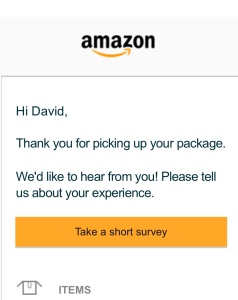Just before nine o’clock last evening, I received an email notification that I book I ordered from Amazon had been delivered to a shipment locker not so far from my home. In what I hope was a self-referential joke on the nature of capital, its name was “Vlad” no less! Since I had just finished my most recent book and was looking forward to adding the new arrival to the pile next to my favorite chair, I decided to head out into the night to retrieve my book.
 I drove to the site of the locker.
I drove to the site of the locker.
Got out of my car.
Walked to the locker.
Entered my password to open the door.
Retrieved by book.
Briefly smiled.
Closed the locker door.
Walked back to my car.
Drove home.
That about it.
Some time later, when I checked my email, I was surprised to discover that Amazon wanted to collect information about my “experience” traveling to meet “Vlad.” The email was excited to hear from me! In fact, in an age when people texting are using less and less puncutation the exuberant exclamation point seems more shallow than ever.
Until that moment, however, I hadn’t thought about the journey to retrieve the book as an experience. Until that moment I hadn’t even thought it as a distinct event. Amazon, however, wanted feedback on that discreet chunk of my life.
It goes with out saying, of course, that the information they wanted to log was any dissatisfaction I might have felt. After all, who logs in to a survey to record the fantastic adventure they had on the way to pick up an Amazon package. Although now that I mention it, perhaps this could be a topic for an excellent children’s book—an updated version of the Dr. Seuss classic, “And to Think That I Saw It on Mulberry Street.”
This got me thinking about an essay by Mark Hunyadi that I just finished. In it he describes how applications invite us to improve our experience of doing things toward the aim of more comfort and less friction with the world. They do not ask us things that might shape, educate, transform or enhance our desires. They do not invite our curiosity.
What I’d like to see is a survey asking for my feedback on the deeper aspects of the purchase that Amazon hides from me. In Hunyadi’s terms, “the instrumental purpose for the system.” Why not ask me questions about Amazon’s carbon footprint? How about inquiring about the salaries of the workers who packed the book? Shipped it? I could go on. (Full disclosure: I made every attempt to purchase this particular book from my local bookseller and only purchased it from Amazon because they had one in the warehouse that could arrive sooner than an indeterminate amount of time in the future.)
I grew up dreaming of a future filled with flying cars and robots, and all I ended up with are emailing algorithms asking about how good it was to pick up packages.
